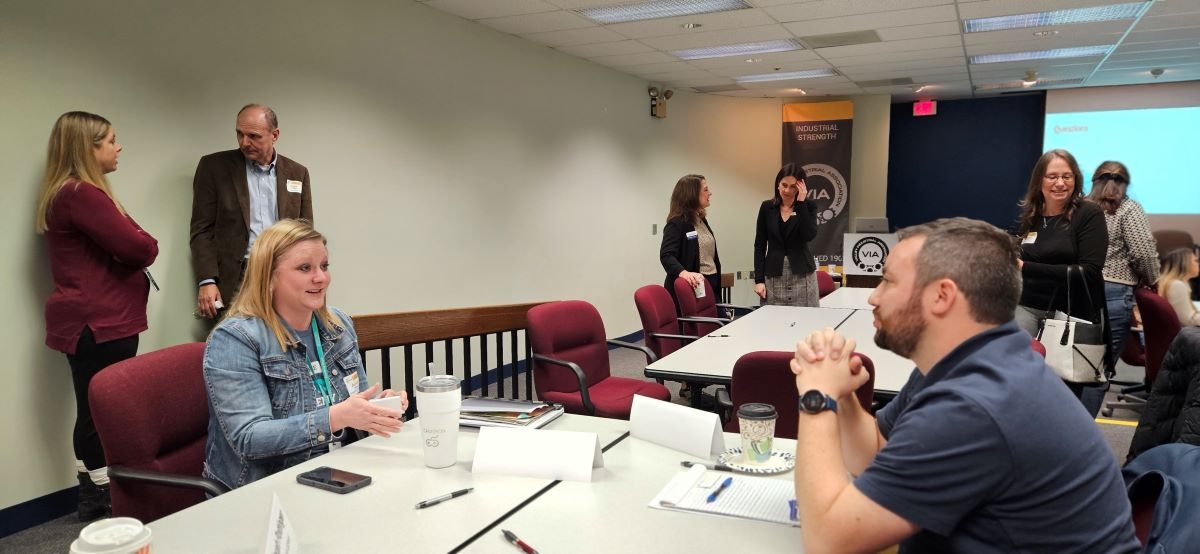Launching a High School Internship Program
One of the most common misconceptions in manufacturing today is that companies can only hire legal adults, or individuals over the age of 18. Many manufacturers are hesitant to hire 16- and 17-year-olds. Not only is this young adult population hirable, but they are also some of the most eager workers, in need of guidance to begin their manufacturing careers.
Working with minors can be an area of concern or even taboo for employers, but it needn’t be. GCAMP and VALEES were excited to work in partnership to host a Workforce Strategies Forum on December 5th, focused on helping manufacturers overcome hiring myths to launch their own high school internship program. Many manufacturers express concern over hiring young adults. Take a look to learn how to overcome these concerns.
“I can’t work with minors”
Many manufacturers are hesitant to hire young adults who are not yet of legal age. Steven Migala of Lavelle Law contributed his legal perspective in the Workforce Strategies Forum. In Illinois, the Illinois Child Labor Law allows employment for workers under the age of 18. The minimum age for employment in Illinois is 16 years of age. On a national level, the Fair Labor Standards Act (FLSA) sets guidelines around hiring minors, and the U.S. Department of Labor enforces these guidelines. The FLSA allows 16- and 17-year-olds to work in manufacturing roles so long as the roles are not considered hazardous. The FLSA identifies 17 specific tasks as Hazardous Occupations (HOs). Take this quiz to see what of your company’s operations are considered hazardous occupations.
“My workplace is too dangerous”
The FLSA provides limited exemptions for 6 of the 17 HOs for 16- and 17-year-olds if the minor is a Student Learner. [1]A Student Learner is defined by the Code of Federal Regulations in CFR 570.50 (c) as being “enrolled in a course of student and training in a cooperative vocational training program under a recognized state or local education authority or in a course of study in a substantially similar program conducted by a private school.” A written agreement must be provided to the student explaining the HOs and the responsibilities of the employer. [2] The agreement should note that: 1) the HOs are incidental to the student’s overall training program, 2) the HO work shall be intermittent for short periods of time and under the direct and close supervision of a qualified and experienced person, 3) safety instructions will be given by the school and correlated with the employer through on-the job-training, and 4) a schedule of organized and progressive work processes have been prepared. The agreement should name the Student Learner and be signed by the employer and the school coordinator or principal.
How do the HOs breakdown? Here’s what 16- and 17-year-old Student Learners can and cannot do:
Hazardous Occupations
What can student learners do?
| Allowed | Never allowed |
|---|---|
| HO 5 - Power-driven woodworking machines | HO 1 - Manufacture explosives |
| HO 8 - Power-driven metal forming, punching, and shearing machines | HO 2 - Drive or assist on motor vehicle on public road |
| HO 12 - Boilers, compactors, and paper-products machines | HO 3 & 9 - Mine or quarry |
| HO 14 - Power-driven circular saws, band saws, guillotine shears, chain saws, reciprocating saws, wood chippers, and abrasive cutting discs | HO 4 - Forest fire, forestry, logging, mills |
| HO 16 - Roofing operations and all work on or about a roof | HO 6 - Radioactive substances or ionizing radiation |
| HO 17 - Trenching or excavation operations | HO 7 - Power-driven hoisting apparatus |
| HO 10 - Power-driven meat processing machine | |
| HO 11 - Power-driven bakery machine | |
| HO 13 - Manufacturing of brick, tile, and kindred products | |
| HO 15 - Wrecking, demolition, or shipbreaking |
Just because a company commonly performs dangerous tasks as part of their manufacturing process does not mean that the company cannot hire minors. When considering hiring a minor, a job description evaluation may be appropriate to identify what a minor can do, and what they may need supervision to do.
"There is too much liability at stake"
Larry Forsberg of Pardridge Insurance and Dallas Rodiek of The Daniel and Henry Company both shared their thoughts at the Workforce Strategies Forum on manufacturers hiring 16- and 17-year-olds. Forsberg specializes in school district insurance policies. He assured manufacturers that young adults hired through Student Learner internships are covered through insurance policies. These insurance policies are extremely comprehensive, providing extensive coverage to students and schools and offering hiring manufacturers peace of mind.
School districts carry student accident insurance. This covers students during school activities. A 16- or 17-year-old hired through an internship program as a Student Learner is covered through this insurance policy. Hiring manufacturers may request to be added to a school district’s coverage as well.
Many manufacturers fear that hiring a minor will cause their insurance costs to increase. Rodiek specializes in manufacturing insurance policies. While every manufacturer’s insurance plan looks different, Rodiek ensured hiring manufacturers that finding an appropriate plan was not nearly as daunting a task as it may seem.
Workers’ compensation insurance rates are not calculated based on the age of an employee. This means that insuring a 16- or 17-year-old is no more expensive than insuring a legal adult. Workers’ compensation rates are calculated based on the job class of the employee rather than their age.
"Young workers won’t stay with the company"
“Why should I invest so many resources into training a young adult who may leave the company in a year or two as they change companies or follow new paths?” Many manufacturers may pose this question to themselves. With busy environments and goals to meet, taking the time and resources to train a brand new, unskilled worker may seem like a waste of time to some manufacturers. Companies’ fear over the lack of commitment from young adults may also be a factor in hesitancy to hire. Hiring 16- and 17-year-olds is still worth the risk.
Many young adults are still discovering their paths and realistically may only stay with a company a short time. Perhaps they will stay their entire lives and become a legacy employee, leaving a lasting impression. Or perhaps they will move on after six months. This is not a reason to forgo an internship program. Instead, this is a reason to celebrate another competent, trained worker entering a new sector of the manufacturing industry. By uplifting young adults, manufacturers can ensure the continuous growth and success of the industry as a whole.
“Why should I care about hiring an intern?”
A large portion of today’s current manufacturing workforce is looking to retire in the upcoming years. Hiring 16- and 17-year-olds is an effective way to start training new workers earlier to become skilled leaders in the industry. By fostering skills and leadership in these young adults, manufacturers can ensure that smart, skilled workers enter the workforce earlier. Fear factors and misconceptions can no longer impact manufacturers’ hiring decisions. The industry is at stake. Now is the time to invest in the future.
Additional Resources
Child Labor Provisions for Nonagricultural Occupations under the Fair Labor Standards Act
Code of Federal Regulations Title 29
Non-Agricultural Employer Self-Assessment Tool | U.S. Department of Labor
GCAMP and VALEES are here to help connect you to resources! Please reach out to Dawn Curran, GCAMP Executive Director at dcurran@gcamp.org or Cassie Blickem, Director of Valley Education for Employment System, EFE #130 at cblickem@waubonsee.edu.
**Disclaimer: No information relayed through this article should be construed as legal advice. Please consult a legal service with questions.


